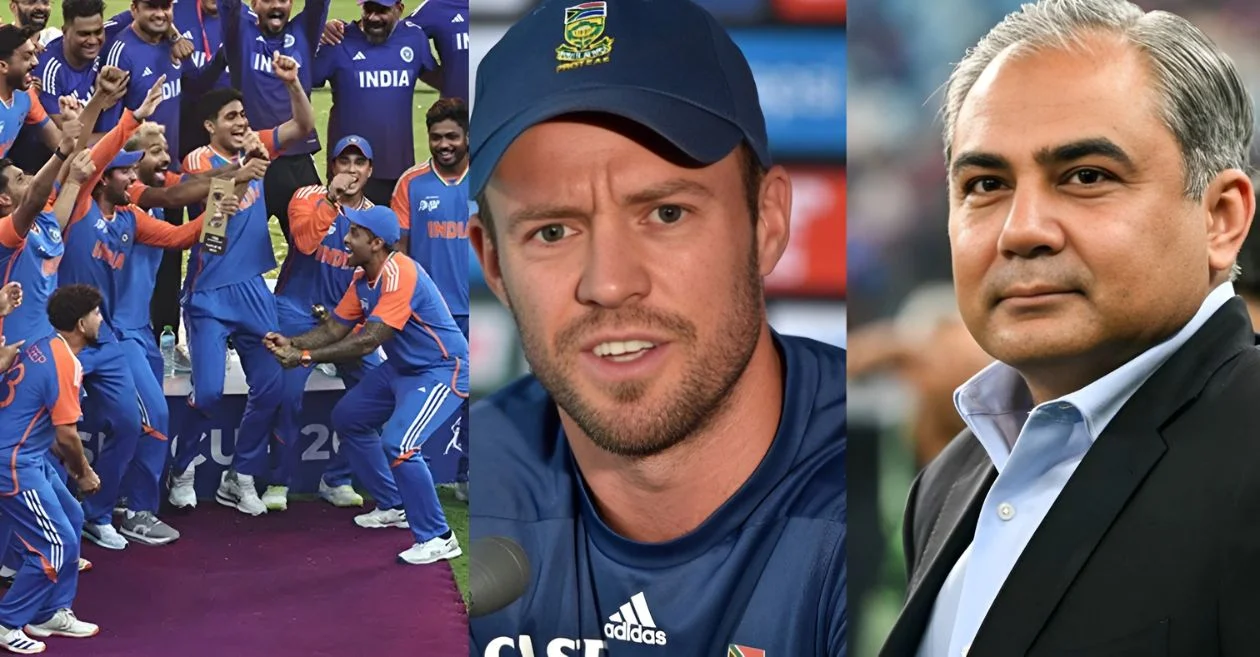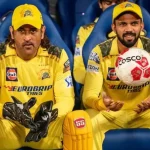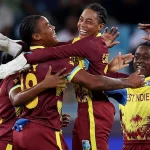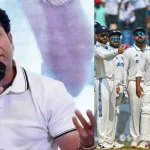The Asia Cup 2025 final between India and Pakistan, held in Dubai, was expected to be a celebration of cricketing excellence and sporting rivalry. India emerged victorious with a thrilling five-wicket win over Pakistan, a result that should have been the centerpiece of global cricket attention. However, the match’s conclusion became embroiled in controversy when Team India refused to accept the trophy and winners’ medals from the Asia Cricket Council (ACC) chief, Mohsin Naqvi, who also holds the position of Pakistan’s Interior Minister.
This unusual and politically charged scenario sparked widespread debate across social media, cricketing forums, and traditional media. The incident was particularly concerning for cricket purists who believe that sports should remain insulated from political disputes. Among the voices that spoke out was South African cricket legend AB de Villiers, who addressed the issue candidly on his weekly #360 YouTube program, emphasizing the importance of separating politics from sport.
The Controversy: India Refuses Trophy Presentation
In the immediate aftermath of India’s win over Pakistan, Mohsin Naqvi reportedly took the Asia Cup trophy and winners’ medals to his hotel room in Dubai, bypassing the traditional on-field presentation ceremony. This action reportedly triggered a series of diplomatic and cricketing debates, with many questioning whether political tension between the two countries had overshadowed the essence of the sport.
According to reports, the Indian team had already decided not to participate in the traditional handshake and trophy acceptance protocols. While on-field celebrations occurred, the absence of the customary presentation was a stark reminder of how politics continues to influence cricket, especially in the India-Pakistan context.
AB de Villiers Weighs In
Recognizing the growing debate, AB de Villiers addressed the issue during his YouTube show, condemning the intrusion of politics into a sporting spectacle. De Villiers emphasized that cricket, like all sports, should remain a domain of merit, competition, and celebration, not political posturing.
“Team India sort of weren’t happy with who was handing out the trophy. I don’t feel that belongs in sport. Politics should stay aside. Sport is one thing, and it should be celebrated for what it is. Quite sad to see that, but hopefully they will sort things out in the future,” De Villiers said.
He continued by explaining how situations like this place players in uncomfortable and unfair positions, diverting attention from their achievements and potentially affecting morale. According to De Villiers, players should be judged and celebrated for their cricketing performance alone, not for navigating external controversies beyond their control.
“It does put the sport, the players, the sportsmen, the cricketers in a very tough position, and that’s what I hate to see. It was quite awkward there at the end,” he added.
The Larger Implications of Politics in Cricket
De Villiers’ critique highlights a persistent challenge in cricket: the interplay of politics and sportsmanship. While India-Pakistan matches are some of the most-watched fixtures globally, these encounters are often influenced by diplomatic tensions, security concerns, and political narratives. For players, such situations create additional stress, forcing them to navigate protocols that may conflict with their principles or team strategy.
In this particular incident, the ACC chief’s dual role as a political figure in Pakistan complicated what should have been a straightforward ceremonial moment. For cricket administrators, this underscores the necessity of clear policies and neutral representation during high-profile international tournaments.
The Asia Cup scenario also raised questions about the role of sporting bodies in mediating political sensitivities. While the ACC is primarily responsible for cricketing administration in Asia, its leadership structure can inadvertently create conflicts of interest when officeholders are politically affiliated with competing nations.
Praise for India’s Cricketing Excellence
While critical of the off-field controversy, AB de Villiers was quick to praise India’s cricketing performance. He highlighted the skill, temperament, and preparation of the Indian T20 squad, particularly as the team builds towards the upcoming T20 World Cup.
“Let’s focus on what’s most important, the cricket itself. India are looking really, really strong. Building up to that big T20 World Cup. Remember, it’s not too far away. And they look like they’ve got a lot of talent, and they play the big moments well. So fantastic to watch,” De Villiers said.
His comments recognized the depth and versatility of the Indian squad, acknowledging the strategic planning and execution that allowed the team to secure a hard-fought victory over a strong Pakistani side. This perspective shifts the narrative back to cricketing achievement, reminding fans and analysts alike that on-field excellence should remain the focus.
Players’ Perspective: Navigating Controversy
Players are often caught in the crossfire of political or diplomatic disputes, forced to balance professional obligations with national sentiment. The Asia Cup 2025 final exemplified this challenge.
For Indian players, refusing the trophy presentation was a principled decision aligned with broader diplomatic stances. However, it also meant foregoing a traditional ceremonial moment, which could have been a career highlight. In this context, De Villiers’ comments underscore the importance of respecting athletes’ roles as sportspeople first, rather than requiring them to serve as instruments in political messaging.
From the perspective of Pakistani players, the incident may have been equally uncomfortable, as they witnessed a moment of international cricket marred by controversy, rather than being able to celebrate the competition on neutral, sporting terms.
The Role of Media and Public Reaction
The Asia Cup final’s controversy quickly dominated headlines worldwide. Social media platforms saw heated debates, with fans divided over the appropriateness of India’s decision. Some supported the move as a necessary political statement, while others criticized it as overshadowing the sporting achievement.
Cricket journalists, analysts, and former players also weighed in, echoing AB de Villiers’ sentiment that politics should not interfere with the integrity and celebration of sport. The incident serves as a case study in how modern sports media not only report events but also shape public discourse, amplifying moments that blend politics and athletics.
Historical Context: Politics and Cricket
India-Pakistan cricket has a long history of being influenced by political tensions. High-profile tournaments, bilateral series, and World Cup encounters often carry significance beyond the boundary ropes. Incidents in previous tournaments, such as neutral venues, security withdrawals, and ceremonial adjustments, have frequently reflected the broader geopolitical climate.
Despite this, cricket has also proven to be a platform for diplomatic soft power, with moments of goodwill occasionally transcending political divides. Friendly gestures between players, joint training camps, and shared media appearances have historically highlighted the unifying potential of the sport.
The Asia Cup 2025 incident, however, demonstrated the opposite: even elite sporting events are not immune to broader national tensions, particularly when administrative roles and political identities intersect.
AB de Villiers’ Wider Message: Respect the Spirit of Cricket
Beyond the specific India-Pakistan controversy, AB de Villiers’ comments carry a broader message for the cricketing world. He stressed the importance of:
-
Maintaining the sanctity of sport: Achievements on the field should be celebrated independently of political agendas.
-
Protecting players from external pressure: Athletes should not be required to navigate situations where political symbolism overshadows performance.
-
Focusing on preparation and execution: Teams should be assessed based on skill, strategy, and results rather than external disputes.
-
Celebrating cricket globally: The sport thrives when competitions are judged on merit and sportsmanship, promoting inclusivity and fair play.
De Villiers’ perspective resonates strongly in an era where social media amplifies controversies, highlighting the need for administrators, teams, and stakeholders to prioritize cricketing integrity over political narratives.
Looking Ahead: India’s T20 World Cup Prospects
Despite the off-field saga, De Villiers’ praise for India’s T20 squad underscores the team’s potential in upcoming tournaments. The squad’s balance, firepower, and depth position them as serious contenders for the next T20 World Cup. Key players, tactical versatility, and strong management are expected to carry India forward, provided political controversies remain at bay and players can focus fully on cricketing objectives.
For fans, analysts, and young cricketers alike, India’s performance in the Asia Cup final serves as a lesson in resilience, skill, and team cohesion, demonstrating that on-field excellence can shine even amid off-field challenges.
Celebrating Cricket Amid Challenges
The Asia Cup 2025 final between India and Pakistan will be remembered as much for the political controversy as for India’s thrilling five-wicket victory. AB de Villiers’ commentary highlighted the essential truth that cricket, at its core, is about competition, skill, and celebration. While politics will inevitably intersect with sport in certain contexts, moments like these reinforce the need to protect the game, respect players’ efforts, and uphold the spirit of cricket.
In reflecting on this incident, the cricketing world is reminded that athletes deserve the spotlight for their achievements, free from external pressures that can overshadow milestones and memories. As India prepares for future tournaments, including the T20 World Cup, the focus remains squarely on team performance, preparation, and cricketing excellence—principles that AB de Villiers eloquently advocates and which fans around the world continue to cherish.
For global cricket, the Asia Cup 2025 finale serves as a cautionary tale and a call to action: celebrate the sport, honor its players, and strive to keep political conflicts from diminishing the joy of the game. In a world where cricket is watched by millions, preserving the integrity of such moments ensures that the spirit of the game continues to inspire generations.
Please check for information on the best betting sites in India – https://selectory.org/best-betting-sites/















